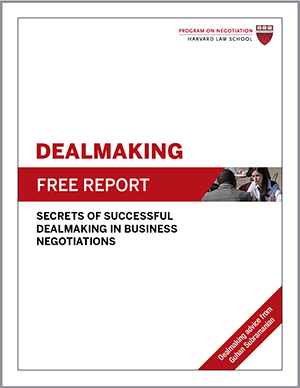
The 1998 merger of German automaker Daimler-Benz and the American Chrysler Corporation at first seemed like a match made in heaven, but the honeymoon wore off as the two cultures that made up DaimlerChrysler began to clash. The Americans’ informal behavior, such as using first names rather than titles, made the Germans uncomfortable, while the Americans felt constrained by the Germans’ controlled meetings. When the company’s German leaders imposed a heavily hierarchical structure and laid off thousands of U.S. workers, trust and morale collapsed. In 2007, the Americans and Germans parted ways.
As the DaimlerChrysler saga illustrates, when making business deals, organizations often neglect to consider their cultural compatibility—to their detriment, writes University of Maryland psychologist Michele Gelfand in her book Rule Makers, Rule Breakers: How Tight and Loose Cultures Wire Our World (Scribner, 2018). When people from different cultures engage in dealmaking, the potential for misunderstandings and conflict is often high. According to Gelfand, a simple yet powerful new cultural framework can help us make sense of our differences, get along better, and achieve more at the bargaining table.
The Tight-Loose Divide
Gelfand has identified a difference that can be applied to virtually all cultures: their relative tightness or looseness, as reflected in the strength of their social norms. The “invisible glue” that holds cultures together, social norms are the behaviors a culture deems acceptable, from whether it’s OK to be late for meetings to how close we should stand to our colleagues to which drugs can be legally consumed. From earliest childhood, we begin to absorb the norms of our culture and adhere to them throughout our lives.
Although all cultures have social norms, their relative “tightness”—and the sanctions people face for breaking them—varies widely, Gelfand and her colleagues found. In relatively “tight” cultures such as Japan, India, and Turkey, people face strict norms regarding everything from littering to punctuality. In “loose” nations such as the United States, Brazil, and the Netherlands, a broader range of behavior is deemed socially acceptable. Asian, Middle Eastern, and Nordic and Germanic European nations tend to be tighter, while English-speaking, Latin, and Eastern European cultures are often looser.
The relative tightness of one’s home culture affects us when we’re making business deals. Speaking broadly, people from the tightest cultures tend to be rule followers; they’re more punctual, self-controlled, and disciplined, and also less open to new ideas and outsiders. By comparison, people from loose cultures are more likely to be rule breakers. This might lead them to take ethical shortcuts in dealmaking, but it may also make them better at creating value in negotiations.
Why do cultures become tight or loose? Gelfand has found that when a nation faces extreme threats to its existence, such as natural disasters, invasions, and disease outbreaks, it seeks to create order by strengthening rules and sanctions. By contrast, nations that face fewer external threats tend to remain loose—more open, less organized.
Bridging the Cultural Divide
When you’re making business deals, the following three deal-making techniques will help you assess your counterparts’ behavior more comprehensively, recognize your own tendencies, and reach better results.
- Improve your “cultural intelligence.” Gelfand has found that people who scored higher on “cultural intelligence,” a measure of one’s ability to adapt to culturally diverse situations, performed better on a negotiation task due to their greater cooperativeness and curiosity. The more you know about your negotiating counterpart’s culture, the better prepared you may be to claim and create value—and to negotiate a deal that lasts.
- Look beyond nationality. Remember that a negotiator’s home country is just one culture to which he or she belongs. Other cultures that may exert a tight-loose influence on a negotiator (including you) may include the person’s region, town, profession, and social class, so don’t read too much into nationality alone.
- Adapt to the other side’s social norms. When we understand the logic behind behaviors that might otherwise seem foreign and frustrating when making business deals, we become more collaborative and effective negotiators. To take one example, Gelfand’s research shows that Americans tend to be more impatient than negotiators from some Middle Eastern and Asian nations. When Americans adapt to the slower pace of counterparts from tighter cultures, they are likely to make fewer concessions, while also building stronger relationships with their counterparts. That’s a win-win that translates into any language.
When making business deals across cultures, have you noticed tight-loose differences, and did they help or hinder the negotiations?






A very insightful article.